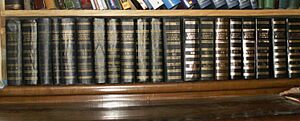Kazimieras Būga facts for kids
Kazimieras Būga (born November 6, 1879 – died December 2, 1924) was an important Lithuanian linguist. A linguist is someone who studies languages. He was also a philologist, which means he studied old texts and languages. Kazimieras Būga was a professor who mostly focused on the Lithuanian language.
Contents
Early Life and Education
Kazimieras Būga was born in a place called Pažiegė, near Dusetos. This area was part of the Russian Empire at the time.
He became a personal secretary to another Lithuanian linguist, Kazimieras Jaunius. This job made Būga very interested in studying languages.
From 1905 to 1912, he studied at Saint Petersburg State University. After that, he continued to learn about Indo-European languages. His teacher was Jan Niecisław Baudouin de Courtenay.
Later, he moved to Königsberg to study more. There, he worked with Adalbert Bezzenberger. In 1914, he earned a master's degree in linguistics.
Important Language Research
Kazimieras Būga did a lot of important research on the Lithuanian language.
Studying Names and Homelands
He started by studying Lithuanian personal names. This led him to research place-names, like names of towns or rivers.
By studying these names, he figured out where the Lithuanians and other Baltic peoples originally lived. He believed their homeland was north of Ukraine, near the Pripyat River. This was around the 6th to 9th centuries CE.
Understanding Loanwords
Būga also studied how Slavic words came into the Baltic languages. These are called loanwords. He looked at when these words were borrowed over time.
The Academic Dictionary
He also worked on the names of early princes from the Grand Duchy of Lithuania. He showed that their names were not Slavic, as some people thought. This research helped start the idea for the Academic Dictionary of Lithuanian. This huge dictionary is called Didysis Lietuvių Kalbos Žodynas in Lithuanian.
Kazimieras Būga passed away in Königsberg. He was buried in the Petrašiūnai Cemetery in Kaunas.
See also
 In Spanish: Kazimieras Būga para niños
In Spanish: Kazimieras Būga para niños


